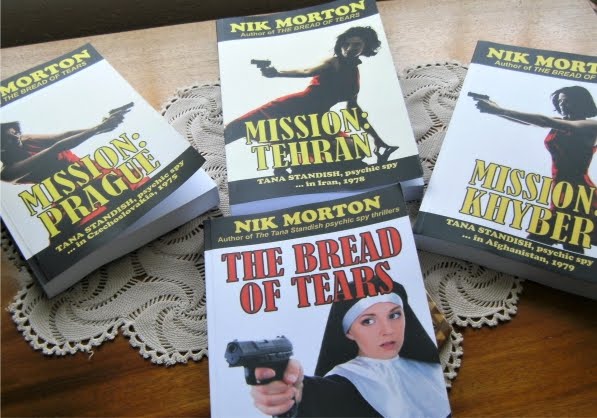Legacy is James Steel’s second book, published in 2010.
His first,
December (2009) and his third
Warlord (2011) were well received; since then he has only produced one
book, a fantasy (2013).
The cover and blurb are misleading, but that’s not the
author’s fault: Nazis do figure in the story, but in the past; the Manchester
Evening News view that Steel is ‘a new contender to the crown of spy thriller
supremo’ is misplaced for this book, though it might be appropriate for
December.
Legacy is interesting, though flawed.
There are three narrative strands.
1) Germany, 1520s, concerning knight Eberhardt von
Stelzenberg, who miraculously survives the Knights War and the Peasants’ War;
he is convinced there is truth in the Dark Heart Prophecy that will destroy
Germany.
2) Germany, 1941, concerning SS Major Otto Hofheim, whose
heart is dark. He is tasked with by Himmler with seeking out the Dark Heart in
Africa, a weapon hinted at in the writings of Eberhardt.
3) England,/Africa/Germany, the present (2010), concerning
Alex Devereux, former cavalry major and now a hardened mercenary, hired by the
mysterious Kalil to capture a diamond mine in the Central African Republic.
Each scene change/time-change should be indicated
consistently, but this is not the case; some shifts are, others are not, which
can momentarily cause confusion in the reader.
While Eberhardt’s story is of interest, it is clear that it
has been shoehorned into this ostensible thriller because the author was
fascinated by the characters and the period. In fact, apart from the vague
reference in the old knight’s writings, it has no relevance to the other two
story strands and could have been dispensed with entirely.
The Nazi Otto is brave, a man who leads from the front and
has earned his men’s approbation in conflict. However, he is an unpleasant
character with no redeeming features. His brief love affair with an ally, an
Arab woman, cannot gloss over his blood-soaked history. His quest into the
African jungle proved fruitless and the narrative seemed rushed. There is a twist, linking Devereux and Otto,
but it wasn’t a surprise.
At least Alex Devereux is in the mould of a modern hero.
Though he feels he has to prove himself. He is bold and businesslike, getting
the project off the ground. Yet he comes across as emotionless; when two of his
comrades are killed in the onslaught against the mine, he is elated at their
success but doesn’t spare a thought for those deaths.
The final revelation concerning the ‘prophecy’ is a
disappointment. The blurb ‘A medieval prophecy with the power to change the
world’ is pure hokum; don’t blame the author, though, blame the publicists and
editors.
The book would have benefitted from a better editor; there
are too many echo words close to each other. And characters ‘think to
themselves’…! And the time-change
headings should have been consistent, as stated.
The history, the character sketches, the military hardware,
all appear to be authentic, however, and the book has a few suspenseful moments
and has pace in parts, which redeem the author.

































